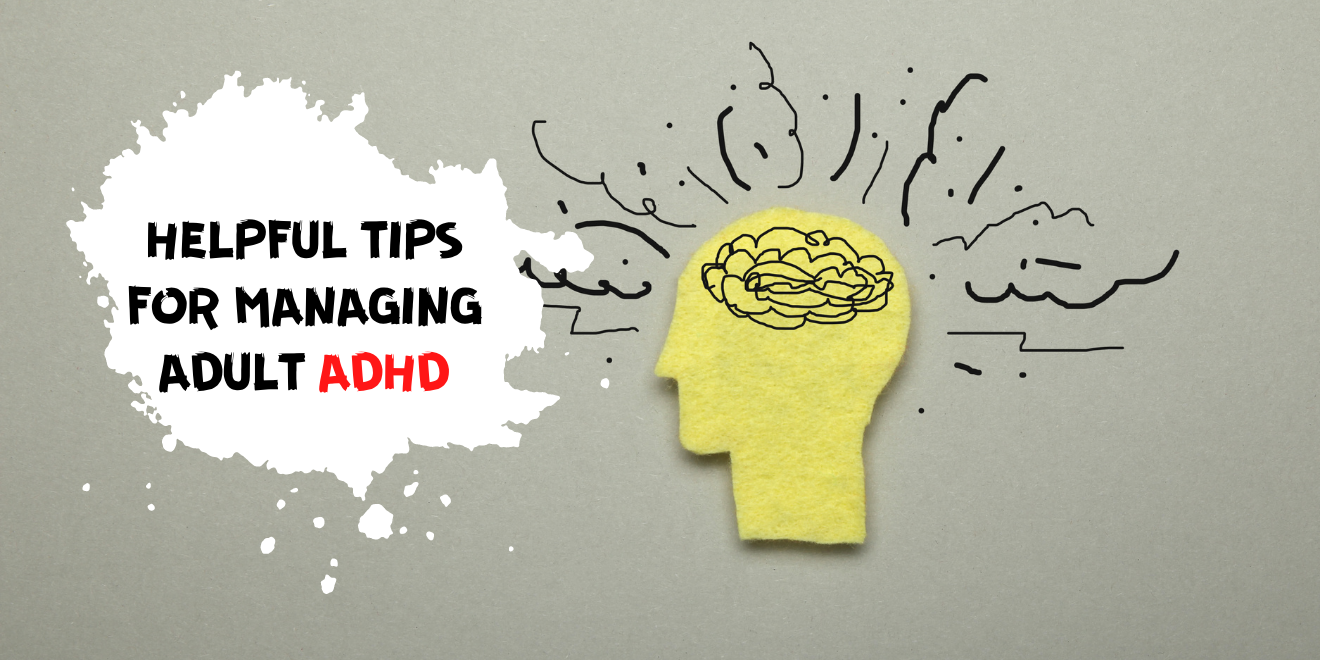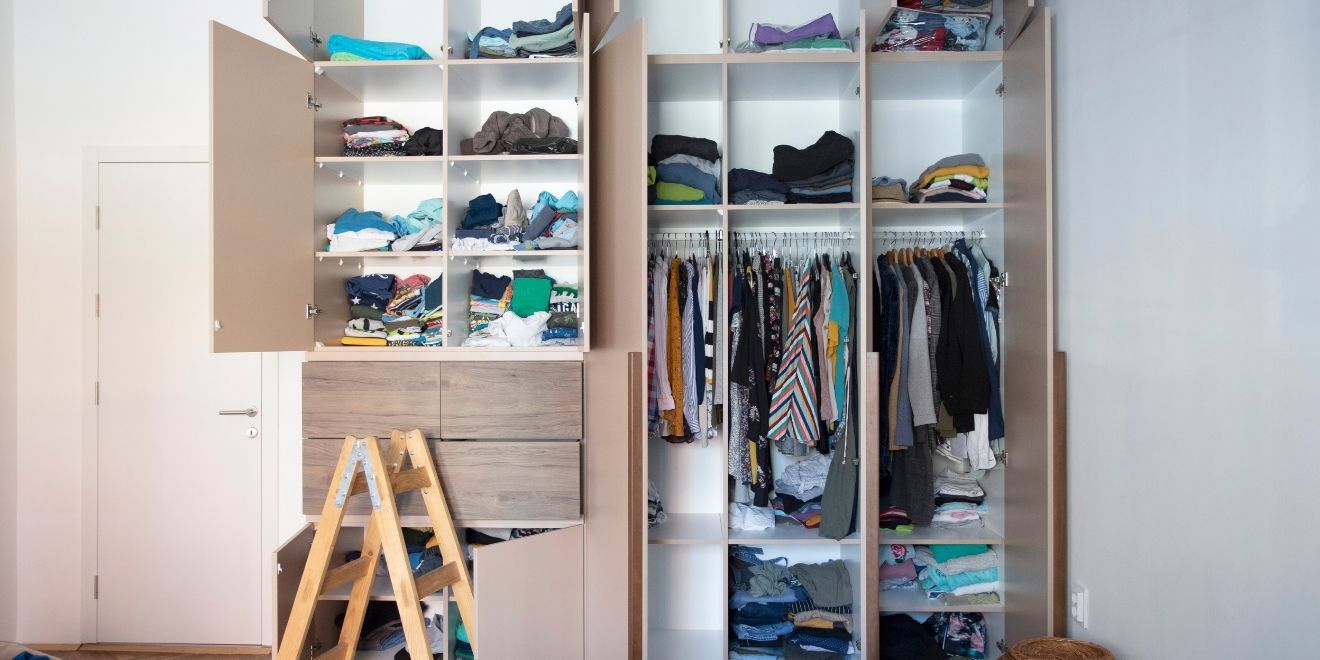Helpful Tips For Managing Adult ADHD

If you are one of the 4% of Americans dealing with adult ADHD, you understand how challenging certain tasks can be. Staying focused at work, keeping organized, and being engaged in personal relationships are all more challenging for adults with an ADHD diagnosis. These symptoms are all worse if your ADHD is untreated or only partially treated.
In addition to the cognitive symptoms of ADHD, people with the disorder can also develop secondary symptoms like anxiety and depression due to feelings of inadequacy and low self-esteem.
Though there isn’t a cure for ADHD, the disorder is absolutely manageable with the right treatments.

Mental health professionals use three main tools to treat ADHD in adults: medication, behavioral therapies, and skill development. If you are only on medication, you may lack some actionable management skills that could genuinely help you get organized.
That’s why…
To be clear, medication is extremely helpful for managing specific symptoms of ADHD. ADHD medications alleviate the disorder's core symptoms while they remain active in your system. The catch is that you can’t always rely on them.
For example, stimulants are commonly prescribed to manage ADHD symptoms, but they can’t be taken at night, or else you risk disrupting your sleep. Other medication may help stabilize your mood but won’t help you develop effective skills for managing symptoms. That’s why medication used in conjunction with other treatments offers the best results for managing adult ADHD.
There are a few talk therapies psychologists recommend to help adults manage both primary and secondary ADHD symptoms.
Cognitive Behavioral Therapy explores the link between thoughts and behaviors. In CBT therapy, you learn how to explore your thoughts and the motivations behind them. Doing so makes it easier to understand your behaviors, opinions, and experiences as shaped by those thoughts. Patients then work on changing their thought patterns in an effort to change their behavior.
One of the symptoms of ADHD is a low tolerance for frustration and the tendency to act impulsively.

Anger management therapy helps patients recognize the triggers that cause outbursts and helps them control and reduce disproportionate emotional reactions. Patients also learn about mindfulness and other approaches to regulating emotions.
Psychoeducation blends therapy and education to help develop patients that are educated about their disorders as well-armed to manage them effectively. Through education, therapists seek to empower and validate patients by giving them the context of their disorders and strategies for living and coping with them.
Medication and therapy are valuable treatments for managing ADHD, but there are additional skills and practices you can implement to treat the symptoms of the disorder. If you search for additional online ADHD treatments , you’ll find some valuable resources and skills for managing the disorder.
By integrating a regular workout into your daily life, you can help manage some of the symptoms of ADHD. Studies show that exercise is not only good for your body, but it is also essential for a healthy mind.

People with ADHD have fewer neurotransmitters—which are essential chemicals in the brain—than people without the disorder. Exercise is a natural way of stimulating the brain to create more essential chemicals.
Exercise also helps reduce stress levels and can improve executive function.
Creating an organization plan that is easy to maintain and follow long-term will help you manage the everyday tasks that are essential for living a happy, healthy, and productive life. Getting organized first starts with your physical living space:
Having a messy, cluttered environment makes performing optimally tricky for anyone, let alone someone with ADHD. The path to a more organized life starts with getting rid of anything you don’t need. Once finished, decluttering frees up space and allows you to focus on organizing the essentials.

It is easy to feel overwhelmed by a messy, unorganized house. That’s why it is critical that you chunk the tasks into smaller pieces to make them more manageable. For example, start with your closet, then your dresser then move to your nightstand. Before long, you have organized your entire room. Repeat this process for your whole living space.
To help prevent essential items from getting lost—like keys, wallets, purses, and backpacks—designate a shelf or a container for those necessary items and place it by the door. By doing this, you are setting yourself up for success and are less likely to lose your essential items.

A large part of getting organized involves structuring our inner lives. We can declutter our homes, but that's only half the battle. There are also skills you can learn to declutter your mind.
Adults with ADHD often struggle with managing their time effectively. However, you can implement a few skills and strategies to get your day on track.

Routines take advantage of our human tendency to form habits. By developing a useful and efficient series of habits that guide us through the day, we will be more productive and organized.
If you write out what you need to accomplish, you can better visualize the progression of your day. It doesn’t matter whether you use a physical planner or a digital one; the important thing is to get into the habit of writing down what you need to take care of and see that it gets done.
Complex, multi-step tasks like paying taxes or preparing for an exam can seem daunting for adults who have symptoms of ADHD.

However, organizing your process for completing big tasks is made much easier when you realize that big complicated tasks are actually a bunch of smaller, more manageable tasks.
When you break an enormous task down into smaller component tasks, the ‘overwhelmingness’ of the problem evaporates. Write out the step-by-step order of smaller tasks and perform them one by one until, eventually, you are left with one large—and complete—task!
Perform one task at a time. Trying to multi-task can frustrate you and derail your efforts to complete the larger task at hand.
We live in an attention-driven world where everything (and everyone) is trying to get you to pay attention to it. This makes getting things done and staying on task hard for anyone—but it is especially difficult for adults with ADHD.
That’s why it is so crucial that you create the ideal environment for getting stuff done. If you have to complete some important tasks, turn off your phone, unplug your TV, close the blinds and set yourself to work.

Medication and therapy are definitely recommended treatments for managing ADHD symptoms. Still, there are more things you can do to empower yourself and create a better-organized and more fulfilling life—despite ADHD symptoms.
Make the time to get enough exercise and prioritize organizing the spaces you work and live in. Then you should work on managing your inner space—build practical organizational skills, time management skills, and task management skills. Through medication, therapy, and the development of essential skills, you can effectively manage ADHD symptoms.
About the Author: Jenn Walker is a freelance writer, blogger, dog enthusiast, and avid beachgoer operating out of Southern New Jersey.
In addition to the cognitive symptoms of ADHD, people with the disorder can also develop secondary symptoms like anxiety and depression due to feelings of inadequacy and low self-esteem.
Though there isn’t a cure for ADHD, the disorder is absolutely manageable with the right treatments.

Mental health professionals use three main tools to treat ADHD in adults: medication, behavioral therapies, and skill development. If you are only on medication, you may lack some actionable management skills that could genuinely help you get organized.
That’s why…
Medication is Not Enough!
To be clear, medication is extremely helpful for managing specific symptoms of ADHD. ADHD medications alleviate the disorder's core symptoms while they remain active in your system. The catch is that you can’t always rely on them.
For example, stimulants are commonly prescribed to manage ADHD symptoms, but they can’t be taken at night, or else you risk disrupting your sleep. Other medication may help stabilize your mood but won’t help you develop effective skills for managing symptoms. That’s why medication used in conjunction with other treatments offers the best results for managing adult ADHD.
Exploring Different Therapies for ADHD Treatment
There are a few talk therapies psychologists recommend to help adults manage both primary and secondary ADHD symptoms.
Cognitive Behavioral Therapy
Cognitive Behavioral Therapy explores the link between thoughts and behaviors. In CBT therapy, you learn how to explore your thoughts and the motivations behind them. Doing so makes it easier to understand your behaviors, opinions, and experiences as shaped by those thoughts. Patients then work on changing their thought patterns in an effort to change their behavior.
Anger Management
One of the symptoms of ADHD is a low tolerance for frustration and the tendency to act impulsively.

Anger management therapy helps patients recognize the triggers that cause outbursts and helps them control and reduce disproportionate emotional reactions. Patients also learn about mindfulness and other approaches to regulating emotions.
Psychoeducation
Psychoeducation blends therapy and education to help develop patients that are educated about their disorders as well-armed to manage them effectively. Through education, therapists seek to empower and validate patients by giving them the context of their disorders and strategies for living and coping with them.
Essential Skills for Managing Adult ADHD
Medication and therapy are valuable treatments for managing ADHD, but there are additional skills and practices you can implement to treat the symptoms of the disorder. If you search for additional online ADHD treatments , you’ll find some valuable resources and skills for managing the disorder.
Regular Excercise
By integrating a regular workout into your daily life, you can help manage some of the symptoms of ADHD. Studies show that exercise is not only good for your body, but it is also essential for a healthy mind.

People with ADHD have fewer neurotransmitters—which are essential chemicals in the brain—than people without the disorder. Exercise is a natural way of stimulating the brain to create more essential chemicals.
Exercise also helps reduce stress levels and can improve executive function.
Getting Organized
Creating an organization plan that is easy to maintain and follow long-term will help you manage the everyday tasks that are essential for living a happy, healthy, and productive life. Getting organized first starts with your physical living space:
Declutter Your Living Space
Having a messy, cluttered environment makes performing optimally tricky for anyone, let alone someone with ADHD. The path to a more organized life starts with getting rid of anything you don’t need. Once finished, decluttering frees up space and allows you to focus on organizing the essentials.

Start Organizing in Chunks, Based on Space
It is easy to feel overwhelmed by a messy, unorganized house. That’s why it is critical that you chunk the tasks into smaller pieces to make them more manageable. For example, start with your closet, then your dresser then move to your nightstand. Before long, you have organized your entire room. Repeat this process for your whole living space.
Have Designated Spaces for Essentials
To help prevent essential items from getting lost—like keys, wallets, purses, and backpacks—designate a shelf or a container for those necessary items and place it by the door. By doing this, you are setting yourself up for success and are less likely to lose your essential items.

Organizing the Non-Physical
A large part of getting organized involves structuring our inner lives. We can declutter our homes, but that's only half the battle. There are also skills you can learn to declutter your mind.
Time Management Skills
Adults with ADHD often struggle with managing their time effectively. However, you can implement a few skills and strategies to get your day on track.

Develop (and Stick to) a Routine
Routines take advantage of our human tendency to form habits. By developing a useful and efficient series of habits that guide us through the day, we will be more productive and organized.
Use a Planner
If you write out what you need to accomplish, you can better visualize the progression of your day. It doesn’t matter whether you use a physical planner or a digital one; the important thing is to get into the habit of writing down what you need to take care of and see that it gets done.
Task Management Skills
Complex, multi-step tasks like paying taxes or preparing for an exam can seem daunting for adults who have symptoms of ADHD.

However, organizing your process for completing big tasks is made much easier when you realize that big complicated tasks are actually a bunch of smaller, more manageable tasks.
Break the Task Down into Smaller Parts
When you break an enormous task down into smaller component tasks, the ‘overwhelmingness’ of the problem evaporates. Write out the step-by-step order of smaller tasks and perform them one by one until, eventually, you are left with one large—and complete—task!
Avoid Multitasking
Perform one task at a time. Trying to multi-task can frustrate you and derail your efforts to complete the larger task at hand.
Avoid Distractions
We live in an attention-driven world where everything (and everyone) is trying to get you to pay attention to it. This makes getting things done and staying on task hard for anyone—but it is especially difficult for adults with ADHD.
That’s why it is so crucial that you create the ideal environment for getting stuff done. If you have to complete some important tasks, turn off your phone, unplug your TV, close the blinds and set yourself to work.

Medication, Therapy, AND Life Skills Are The Proven Way To Manage Adult ADHD
Medication and therapy are definitely recommended treatments for managing ADHD symptoms. Still, there are more things you can do to empower yourself and create a better-organized and more fulfilling life—despite ADHD symptoms.
Make the time to get enough exercise and prioritize organizing the spaces you work and live in. Then you should work on managing your inner space—build practical organizational skills, time management skills, and task management skills. Through medication, therapy, and the development of essential skills, you can effectively manage ADHD symptoms.
About the Author: Jenn Walker is a freelance writer, blogger, dog enthusiast, and avid beachgoer operating out of Southern New Jersey.




































































































